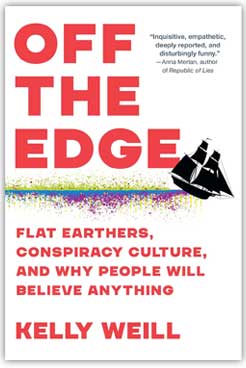Book Review: Off the Edge: Flat Earthers, Conspiracy Culture, and Why People Will Believe Anything
18 January 2024
Off the Edge: Flat Earthers, Conspiracy Culture, and Why People Will Believe Anything. By Kelly Weill. Hachette Book Group; www.hachettebookgroup.com; 256 pages; $16.99
 The name of the 1980s band Devo comes from the concept of de-evolution, that society is not evolving—rather it is regressing. While the overall idea may be a joke, there are parts of it that ring true.
The name of the 1980s band Devo comes from the concept of de-evolution, that society is not evolving—rather it is regressing. While the overall idea may be a joke, there are parts of it that ring true.
The Internet has created an information highway. But on that highway, there is plenty of misinformation, making fact-checking a necessary part of verifying a news story. When it comes to factual science, things should be eminently clear. But that has not stopped many people from believing conspiracy theories.
In Off the Edge: Flat Earthers, Conspiracy Culture, and Why People Will Believe Anything, author Kelly Weill has written an informative book that explains why people believe in conspiracy theories and the like. People latch onto conspiracy theories because they help believers feel safe by providing an explanation for things that feel incomprehensible and beyond their control.
Weill writes how much of the proliferation of flat earth and conspiratorial content has been intensified by social media platforms such as YouTube, which incentivizes views. YouTube flat earth videos are algorithm gold because they result in massive hits and views. YouTube, Instagram, Facebook, and other channels are concerned not with the truth, but rather with making a profit. And nothing drives those views like conspiratorial content.
So, where does flat earth theory tie into what security is about? Nothing directly. Except that many of its proponents may be employees, consultants, or contractors.
The question arises—how could someone believe in a flat earth when there is zero evidence to support it and an overwhelming and prodigious amount of data to support a spherical earth? Weill writes that a flat earth works only if no one tries it. When globe earthers try debating flat earthers, they can only reply with nonsensical answers, such as that NASA is a conspiracy and all of the agency’s employees are in on it.
Flat earthers often talk of open knowledge, independent thinking, and transparency. But most of them gain their knowledge not from textbooks, but rather from flashy YouTube videos and secondhand knowledge. The collateral damage that conspiracy theories create is significant.
The situation is unlikely to get better anytime soon, especially as people are using TikTok as their news source of choice. This is a book that is entertaining, enlightening, and at times depressing for the message it conveys. But it’s an important reference to understand a hopefully small subset of workers that may be part of your company.
Reviewer: Ben Rothke, CISSP, CISM, CISA, is a New York City-based senior information security manager with Tapad. He has more than 20 years of industry experience in information systems security and privacy. His areas of expertise are in risk management and mitigation, security and privacy regulatory issues, design and implementation of systems security, encryption, cryptography, and security policy development. He wrote Computer Security—20 Things Every Employee Should Know.
This article has been archived for your research. The original version from Google News can be found here.


